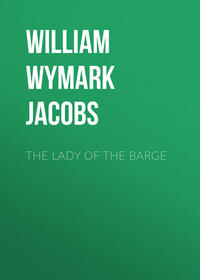 полная версия
полная версияOdd Craft, Complete
Bob Pretty scratched ‘is ‘ead and looked at ‘im out of the corner of ‘is eye, but he ‘adn’t got any answer. Then ‘e sat biting his finger-nails and thinking while the keepers stood argyfying as to who should take ‘is clothes off and go into the pond arter the pheasants. It was a very cold night and the pond was pretty deep in places, and none of ‘em seemed anxious.
“Make ‘im go in for it,” ses Lewis, looking at Bob; “‘e chucked it in.”
“On’y Becos I thought you was poachers,” ses Bob. “I’m sorry to ‘ave caused so much trouble.”
“Well, you go in and get it out,” ses Lewis, who pretty well guessed who’d ‘ave to do it if Bob didn’t. “It’ll look better for you, too.”
“I’ve got my defence all right,” ses Bob Pretty. “I ain’t set a foot on the squire’s preserves, and I found this sack a ‘undred yards away from it.”
“Don’t waste more time,” ses Mr. Cutts to Lewis.
“Off with your clothes and in with you. Anybody’d think you was afraid of a little cold water.”
“Whereabouts did ‘e pitch it in?” ses Lewis.
Bob Pretty pointed with ‘is finger exactly where ‘e thought it was, but they wouldn’t listen to ‘im, and then Lewis, arter twice saying wot a bad cold he’d got, took ‘is coat off very slow and careful.
“I wouldn’t mind going in to oblige you,” ses Bob Pretty, “but the pond is so full o’ them cold, slimy efts; I don’t fancy them crawling up agin me, and, besides that, there’s such a lot o’ deep holes in it. And wotever you do don’t put your ‘ead under; you know ‘ow foul that water is.”
Keeper Lewis pretended not to listen to ‘im. He took off ‘is clothes very slowly and then ‘e put one foot in and stood shivering, although Smith, who felt the water with his ‘and, said it was quite warm. Then Lewis put the other foot in and began to walk about careful, ‘arf-way up to ‘is knees.
“I can’t find it,” he ses, with ‘is teeth chattering.
“You ‘aven’t looked,” ses Mr. Cutts; “walk about more; you can’t expect to find it all at once. Try the middle.”
Lewis tried the middle, and ‘e stood there up to ‘is neck, feeling about with his foot and saying things out loud about Bob Pretty, and other things under ‘is breath about Mr. Cutts.
“Well, I’m going off ‘ome,” ses Bob Pretty, getting up. “I’m too tender-’arted to stop and see a man drownded.”
“You stay ‘ere,” ses Mr. Cutts, catching ‘old of him.
“Wot for?” ses Bob; “you’ve got no right to keep me ‘ere.”
“Catch ‘old of ‘im, Joe,” ses Mr. Cutts, quick-like.
Smith caught ‘old of his other arm, and Lewis left off trying to find the sack to watch the struggle. Bob Pretty fought ‘ard, and once or twice ‘e nearly tumbled Mr. Cutts into the pond, but at last ‘e gave in and lay down panting and talking about ‘is loryer. Smith ‘eld him down on the ground while Mr. Cutts kept pointing out places with ‘is finger for Lewis to walk to. The last place ‘e pointed to wanted a much taller man, but it wasn’t found out till too late, and the fuss Keeper Lewis made when ‘e could speak agin was terrible.
“You’d better come out,” ses Mr. Cutts; “you ain’t doing no good. We know where they are and we’ll watch the pond till daylight—that is, unless Smith ‘ud like to ‘ave a try.”
“It’s pretty near daylight now, I think,” ses Smith.
Lewis came out and ran up and down to dry ‘imself, and finished off on ‘is pocket-’andkerchief, and then with ‘is teeth chattering ‘e began to dress ‘imself. He got ‘is shirt on, and then ‘e stood turning over ‘is clothes as if ‘e was looking for something.
“Never mind about your stud now,” ses Mr. Cutts; “hurry up and dress.”
“Stud?” ses Lewis, very snappish. “I’m looking for my trowsis.”
“Your trowsis?” ses Smith, ‘elping ‘im look.
“I put all my clothes together,” ses Lewis, a’most shouting. “Where are they? I’m ‘arf perished with cold. Where are they?”
“He ‘ad ‘em on this evening,” ses Bob Pretty, “‘cos I remember noticing ‘em.”
“They must be somewhere about,” ses Mr. Cutts; “why don’t you use your eyes?”
He walked up and down, peering about, and as for Lewis he was ‘opping round ‘arf crazy.
“I wonder,” ses Bob Pretty, in a thoughtful voice, to Smith—“I wonder whether you or Mr. Cutts kicked ‘em in the pond while you was struggling with me. Come to think of it, I seem to remember ‘earing a splash.”
“He’s done it, Mr. Cutts,” ses Smith; “never mind, it’ll go all the ‘arder with ‘im.”
“But I do mind,” ses Lewis, shouting. “I’ll be even with you for this, Bob Pretty. I’ll make you feel it. You wait till I’ve done with you. You’ll get a month extra for this, you see if you don’t.”
“Don’t you mind about me,” ses Bob; “you run off ‘ome and cover up them legs of yours. I found that sack, so my conscience is clear.”
Lewis put on ‘is coat and waistcoat and set off, and Mr. Cutts and Smith, arter feeling about for a dry place, set theirselves down and began to smoke.
“Look ‘ere,” ses Bob Pretty, “I’m not going to sit ‘ere all night to please you; I’m going off ‘ome. If you want me you’ll know where to find me.”
“You stay where you are,” ses Mr. Cutts. “We ain’t going to let you out of our sight.”
“Very well, then, you take me ‘ome,” ses Bob. “I’m not going to catch my death o’ cold sitting ‘ere. I’m not used to being out of a night like you are. I was brought up respectable.”
“I dare say,” ses Mr. Cutts. “Take you ‘ome, and then ‘ave one o’ your mates come and get the sack while we’re away.”
Then Bob Pretty lost ‘is temper, and the things ‘e said about Mr. Cutts wasn’t fit for Smith to ‘ear. He threw ‘imself down at last full length on the ground and sulked till the day broke.
Keeper Lewis was there a’most as soon as it was light, with some long hay-rakes he’d borrowed, and I should think that pretty near ‘arf the folks in Clay-bury ‘ad turned up to see the fun. Mrs. Pretty was crying and wringing ‘er ‘ands; but most folks seemed to be rather pleased that Bob ‘ad been caught at last.
In next to no time ‘arf-a-dozen rakes was at work, and the things they brought out o’ that pond you wouldn’t believe. The edge of it was all littered with rusty tin pails and saucepans and such-like, and by-and-by Lewis found the things he’d ‘ad to go ‘ome without a few hours afore, but they didn’t seem to find that sack, and Bob Pretty, wot was talking to ‘is wife, began to look ‘opeful.
But just then the squire came riding up with two friends as was staying with ‘im, and he offered a reward of five shillings to the man wot found it. Three or four of ‘em waded in up to their middle then and raked their ‘ardest, and at last Henery Walker give a cheer and brought it to the side, all heavy with water.
“That’s the sack I found, sir,” ses Bob, starting up. “It wasn’t on your land at all, but on the field next to it. I’m an honest, ‘ardworking man, and I’ve never been in trouble afore. Ask anybody ‘ere and they’ll tell you the same.”
Squire Rockett took no notice of ‘im. “Is that the sack?” he asks, turning to Mr. Cutts.
“That’s the one, sir,” ses Mr. Cutts. “I’d swear to it anywhere.”
“You’d swear a man’s life away,” ses Bob. “‘Ow can you swear to it when it was dark?”
Mr. Cutts didn’t answer ‘im. He went down on ‘is knees and cut the string that tied up the mouth o’ the sack, and then ‘e started back as if ‘e’d been shot, and ‘is eyes a’most started out of ‘is ‘ead.
“Wot’s the matter?” ses the squire.
Mr. Cutts couldn’t speak; he could only stutter and point at the sack with ‘is finger, and Henery Walker, as was getting curious, lifted up the other end of it and out rolled a score of as fine cabbages as you could wish to see.
I never see people so astonished afore in all my born days, and as for Bob Pretty, ‘e stood staring at them cabbages as if ‘e couldn’t believe ‘is eyesight.
“And that’s wot I’ve been kept ‘ere all night for,” he ses, at last, shaking his ‘ead. “That’s wot comes o’ trying to do a kindness to keepers, and ‘elping of ‘em in their difficult work. P’r’aps that ain’t the sack arter all, Mr. Cutts. I could ha’ sworn they was pheasants in the one I found, but I may be mistook, never ‘aving ‘ad one in my ‘ands afore. Or p’r’aps somebody was trying to ‘ave a game with you, Mr. Cutts, and deceived me instead.”
The keepers on’y stared at ‘im.
“You ought to be more careful,” ses Bob. “Very likely while you was taking all that trouble over me, and Keeper Lewis was catching ‘is death o’ cold, the poachers was up at the plantation taking all they wanted. And, besides, it ain’t right for Squire Rockett to ‘ave to pay Henery Walker five shillings for finding a lot of old cabbages. I shouldn’t like it myself.”
He looked out of the corner of ‘is eye at the squire, as was pretending not to notice Henery Walker touching ‘is cap to him, and then ‘e turns to ‘is wife and he ses:
“Come along, old gal,” ‘e ses. “I want my breakfast bad, and arter that I shall ‘ave to lose a honest day’s work in bed.”
DIXON’S RETURN
Talking about eddication, said the night-watchman, thoughtfully, the finest eddication you can give a lad is to send ‘im to sea. School is all right up to a certain p’int, but arter that comes the sea. I’ve been there myself and I know wot I’m talking about. All that I am I owe to ‘aving been to sea.
There’s a saying that boys will be boys. That’s all right till they go to sea, and then they ‘ave to be men, and good men too. They get knocked about a bit, o’ course, but that’s all part o’ the eddication, and when they get bigger they pass the eddication they’ve received on to other boys smaller than wot they are. Arter I’d been at sea a year I spent all my fust time ashore going round and looking for boys wot ‘ad knocked me about afore I sailed, and there was only one out o’ the whole lot that I wished I ‘adn’t found.
Most people, o’ course, go to sea as boys or else not at all, but I mind one chap as was pretty near thirty years old when ‘e started. It’s a good many years ago now, and he was landlord of a public-’ouse as used to stand in Wapping, called the Blue Lion.
His mother, wot had ‘ad the pub afore ‘im, ‘ad brought ‘im up very quiet and genteel, and when she died ‘e went and married a fine, handsome young woman who ‘ad got her eye on the pub without thinking much about ‘im. I got to know about it through knowing the servant that lived there. A nice, quiet gal she was, and there wasn’t much went on that she didn’t hear. I’ve known ‘er to cry for hours with the ear-ache, pore gal.
Not caring much for ‘er ‘usband, and being spoiled by ‘im into the bargain, Mrs. Dixon soon began to lead ‘im a terrible life. She was always throwing his meekness and mildness up into ‘is face, and arter they ‘ad been married two or three years he was no more like the landlord o’ that public-’ouse than I’m like a lord. Not so much. She used to get into such terrible tempers there was no doing anything with ‘er, and for the sake o’ peace and quietness he gave way to ‘er till ‘e got into the habit of it and couldn’t break ‘imself of it.
They ‘adn’t been married long afore she ‘ad her cousin, Charlie Burge, come in as barman, and a month or two arter that ‘is brother Bob, who ‘ad been spending a lot o’ time looking for work instead o’ doing it, came too. They was so comfortable there that their father—a ‘ouse-painter by trade—came round to see whether he couldn’t paint the Blue Lion up a bit and make ‘em look smart, so that they’d get more trade. He was one o’ these ‘ere fust-class ‘ousepainters that can go to sleep on a ladder holding a brush in one hand and a pot o’ paint in the other, and by the time he ‘ad finished painting the ‘ouse it was ready to be done all over agin.
I dare say that George Dixon—that was ‘is name—wouldn’t ha’ minded so much if ‘is wife ‘ad only been civil, but instead o’ that she used to make fun of ‘im and order ‘im about, and by-and-by the others began to try the same thing. As I said afore, Dixon was a very quiet man, and if there was ever anybody to be put outside Charlie or Bob used to do it. They tried to put me outside once, the two of ‘em, but they on’y did it at last by telling me that somebody ‘ad gone off and left a pot o’ beer standing on the pavement. They was both of ‘em fairly strong young chaps with a lot of bounce in ‘em, and she used to say to her ‘usband wot fine young fellers they was, and wot a pity it was he wasn’t like ‘em.
Talk like this used to upset George Dixon awful. Having been brought up careful by ‘is mother, and keeping a very quiet, respectable ‘ouse—I used it myself—he cert’nly was soft, and I remember ‘im telling me once that he didn’t believe in fighting, and that instead of hitting people you ought to try and persuade them. He was uncommon fond of ‘is wife, but at last one day, arter she ‘ad made a laughing-stock of ‘im in the bar, he up and spoke sharp to her.
“Wot?” ses Mrs. Dixon, ‘ardly able to believe her ears.
“Remember who you’re speaking to; that’s wot I said,” ses Dixon.
“‘Ow dare you talk to me like that?” screams ‘is wife, turning red with rage. “Wot d’ye mean by it?”
“Because you seem to forget who is master ‘ere,” ses Dixon, in a trembling voice.
“Master?” she ses, firing up. “I’ll soon show you who’s master. Go out o’ my bar; I won’t ‘ave you in it. D’ye ‘ear? Go out of it.”
Dixon turned away and began to serve a customer. “D’ye hear wot I say?” ses Mrs. Dixon, stamping ‘er foot. “Go out o’ my bar. Here, Charlie!”
“Hullo!” ses ‘er cousin, who ‘ad been standing looking on and grinning.
“Take the master and put ‘im into the parlour,” ses Mrs. Dixon, “and don’t let ‘im come out till he’s begged my pardon.”
“Go on,” ses Charlie, brushing up ‘is shirt-sleeves; “in you go. You ‘ear wot she said.”
He caught ‘old of George Dixon, who ‘ad just turned to the back o’ the bar to give a customer change out of ‘arf a crown, and ran ‘im kicking and struggling into the parlour. George gave ‘im a silly little punch in the chest, and got such a bang on the ‘ead back that at fust he thought it was knocked off.
When ‘e came to ‘is senses agin the door leading to the bar was shut, and ‘is wife’s uncle, who ‘ad been asleep in the easy-chair, was finding fault with ‘im for waking ‘im up.
“Why can’t you be quiet and peaceable?” he ses, shaking his ‘ead at him. “I’ve been ‘ard at work all the morning thinking wot colour to paint the back-door, and this is the second time I’ve been woke up since dinner. You’re old enough to know better.”
“Go and sleep somewhere else, then,” ses Dixon. “I don’t want you ‘ere at all, or your boys neither. Go and give somebody else a treat; I’ve ‘ad enough of the whole pack of you.”
He sat down and put ‘is feet in the fender, and old Burge, as soon as he ‘ad got ‘is senses back, went into the bar and complained to ‘is niece, and she came into the parlour like a thunderstorm.
“You’ll beg my uncle’s pardon as well as mine afore you come out o’ that room,” she said to her ‘usband; “mind that.”
George Dixon didn’t say a word; the shame of it was a’most more than ‘e could stand. Then ‘e got up to go out o’ the parlour and Charlie pushed ‘im back agin. Three times he tried, and then ‘e stood up and looked at ‘is wife.
“I’ve been a good ‘usband to you,” he ses; “but there’s no satisfying you. You ought to ha’ married somebody that would ha’ knocked you about, and then you’d ha’ been happy. I’m too fond of a quiet life to suit you.”
“Are you going to beg my pardon and my uncle’s pardon?” ses ‘is wife, stamping ‘er foot.
“No,” ses Dixon; “I am not. I’m surprised at you asking it.”
“Well, you don’t come out o’ this room till you do,” ses ‘is wife.
“That won’t hurt me,” ses Dixon. “I couldn’t look anybody in the face arter being pushed out o’ my own bar.”
They kept ‘im there all the rest o’ the day, and, as ‘e was still obstinate when bedtime came, Mrs. Dixon, who wasn’t to be beat, brought down some bedclothes and ‘ad a bed made up for ‘im on the sofa. Some men would ha’ ‘ad the police in for less than that, but George Dixon ‘ad got a great deal o’ pride and ‘e couldn’t bear the shame of it. Instead o’ that ‘e acted like a fourteen-year-old boy and ran away to sea.
They found ‘im gone when they came down in the morning, and the side-door on the latch. He ‘ad left a letter for ‘is wife on the table, telling ‘er wot he ‘ad done. Short and sweet it was, and wound up with telling ‘er to be careful that her uncle and cousins didn’t eat ‘er out of house and ‘ome.
She got another letter two days arterward, saying that he ‘ad shipped as ordinary seaman on an American barque called the Seabird, bound for California, and that ‘e expected to be away a year, or thereabouts.
“It’ll do ‘im good,” ses old Burge, when Mrs. Dixon read the letter to ‘em. “It’s a ‘ard life is the sea, and he’ll appreciate his ‘ome when ‘e comes back to it agin. He don’t know when ‘e’s well off. It’s as comfortable a ‘ome as a man could wish to ‘ave.” It was surprising wot a little difference George Dixon’s being away made to the Blue Lion. Nobody seemed to miss ‘im much, and things went on just the same as afore he went. Mrs. Dixon was all right with most people, and ‘er relations ‘ad a very good time of it; old Burge began to put on flesh at such a rate that the sight of a ladder made ‘im ill a’most, and Charlie and Bob went about as if the place belonged to ‘em.
They ‘eard nothing for eight months, and then a letter came for Mrs. Dixon from her ‘usband in which he said that ‘e had left the Seabird after ‘aving had a time which made ‘im shiver to think of. He said that the men was the roughest of the rough and the officers was worse, and that he ‘ad hardly ‘ad a day without a blow from one or the other since he’d been aboard. He’d been knocked down with a hand-spike by the second mate, and had ‘ad a week in his bunk with a kick given ‘im by the boatswain. He said ‘e was now on the Rochester Castle, bound for Sydney, and he ‘oped for better times.
That was all they ‘eard for some months, and then they got another letter saying that the men on the Rochester Castle was, if anything, worse than those on the Seabird, and that he’d begun to think that running away to sea was diff’rent to wot he’d expected, and that he supposed ‘e’d done it too late in life. He sent ‘is love to ‘is wife and asked ‘er as a favour to send Uncle Burge and ‘is boys away, as ‘e didn’t want to find them there when ‘e came home, because they was the cause of all his sufferings.
“He don’t know ‘is best friends,” ses old Burge. “‘E’s got a nasty sperrit I don’t like to see.”
“I’ll ‘ave a word with ‘im when ‘e does come home,” ses Bob. “I s’pose he thinks ‘imself safe writing letters thousands o’ miles away.”
The last letter they ‘ad came from Auckland, and said that he ‘ad shipped on the Monarch, bound for the Albert Docks, and he ‘oped soon to be at ‘ome and managing the Blue Lion, same as in the old happy days afore he was fool enough to go to sea.
That was the very last letter, and some time arterward the Monarch was in the missing list, and by-and-by it became known that she ‘ad gone down with all hands not long arter leaving New Zealand. The only difference it made at the Blue Lion was that Mrs. Dixon ‘ad two of ‘er dresses dyed black, and the others wore black neckties for a fortnight and spoke of Dixon as pore George, and said it was a funny world, but they supposed everything was for the best.
It must ha’ been pretty near four years since George Dixon ‘ad run off to sea when Charlie, who was sitting in the bar one arternoon reading the paper, things being dull, saw a man’s head peep through the door for a minute and then disappear. A’most direckly arterward it looked in at another door and then disappeared agin. When it looked in at the third door Charlie ‘ad put down ‘is paper and was ready for it.
“Who are you looking for?” he ses, rather sharp. “Wot d’ye want? Are you ‘aving a game of peepbo, or wot?”
The man coughed and smiled, and then ‘e pushed the door open gently and came in, and stood there fingering ‘is beard as though ‘e didn’t know wot to say.
“I’ve come back, Charlie,” he ses at last.
“Wot, George!” ses Charlie, starting. “Why, I didn’t know you in that beard. We all thought you was dead, years ago.”
“I was pretty nearly, Charlie,” ses Dixon, shaking his ‘ead. “Ah! I’ve ‘ad a terrible time since I left ‘once.”
“‘You don’t seem to ha’ made your fortune,” ses Charlie, looking down at ‘is clothes. “I’d ha’ been ashamed to come ‘ome like that if it ‘ad been me.”
“I’m wore out,” ses Dixon, leaning agin the bar. “I’ve got no pride left; it’s all been knocked out of me. How’s Julia?”
“She’s all right,” ses Charlie. “Here, Ju—”
“H’sh!” ses Dixon, reaching over the bar and laying his ‘and on his arm. “Don’t let ‘er know too sudden; break it to ‘er gently.”
“Fiddlesticks!” ses Charlie, throwing his ‘and off and calling, “Here, Julia! He’s come back.”
Mrs. Dixon came running downstairs and into the bar. “Good gracious!” she ses, staring at her ‘us-band. “Whoever’d ha’ thought o’ seeing you agin? Where ‘ave you sprung from?”
“Ain’t you glad to see me, Julia?” ses George Dixon.
“Yes, I s’pose so; if you’ve come back to behave yourself,” ses Mrs. Dixon. “What ‘ave you got to say for yourself for running away and then writing them letters, telling me to get rid of my relations?”
“That’s a long time ago, Julia,” ses Dixon, raising the flap in the counter and going into the bar. “I’ve gone through a great deal o’ suffering since then. I’ve been knocked about till I ‘adn’t got any feeling left in me; I’ve been shipwrecked, and I’ve ‘ad to fight for my life with savages.”
“Nobody asked you to run away,” ses his wife, edging away as he went to put his arm round ‘er waist. “You’d better go upstairs and put on some decent clothes.”
Dixon looked at ‘er for a moment and then he ‘ung his ‘ead.
“I’ve been thinking o’ you and of seeing you agin every day since I went away, Julia,” he ses. “You’d be the same to me if you was dressed in rags.”
He went upstairs without another word, and old Burge, who was coming down, came down five of ‘em at once owing to Dixon speaking to ‘im afore he knew who ‘e was. The old man was still grumbling when Dixon came down agin, and said he believed he’d done it a-purpose.
“You run away from a good ‘ome,” he ses, “and the best wife in Wapping, and you come back and frighten people ‘arf out o’ their lives. I never see such a feller in all my born days.”
“I was so glad to get ‘ome agin I didn’t think,” ses Dixon. “I hope you’re not ‘urt.”
He started telling them all about his ‘ardships while they were at tea, but none of ‘em seemed to care much about hearing ‘em. Bob said that the sea was all right for men, and that other people were sure not to like it.
“And you brought it all on yourself,” ses Charlie. “You’ve only got yourself to thank for it. I ‘ad thought o’ picking a bone with you over those letters you wrote.”
“Let’s ‘ope ‘e’s come back more sensible than wot ‘e was when ‘e went away,” ses old Burge, with ‘is mouth full o’ toast.
By the time he’d been back a couple o’ days George Dixon could see that ‘is going away ‘adn’t done any good at all. Nobody seemed to take any notice of ‘im or wot he said, and at last, arter a word or two with Charlie about the rough way he spoke to some o’ the customers, Charlie came in to Mrs. Dixon and said that he was at ‘is old tricks of interfering, and he would not ‘ave it.
“Well, he’d better keep out o’ the bar altogether,” ses Mrs. Dixon. “There’s no need for ‘im to go there; we managed all right while ‘e was away.”
“Do you mean I’m not to go into my own bar?” ses Dixon, stammering.
“Yes, I do,” ses Mrs. Dixon. “You kept out of it for four years to please yourself, and now you can keep out of it to please me.”
“I’ve put you out o’ the bar before,” ses Charlie, “and if you come messing about with me any more I’ll do it agin. So now you know.”
He walked back into the bar whistling, and George Dixon, arter sitting still for a long time thinking, got up and went into the bar, and he’d ‘ardly got his foot inside afore Charlie caught ‘old of ‘im by the shoulder and shoved ‘im back into the parlour agin.
“I told you wot it would be,” ses Mrs. Dixon, looking up from ‘er sewing. “You’ve only got your interfering ways to thank for it.”
“This is a fine state of affairs in my own ‘ouse,” ses Dixon, ‘ardly able to speak. “You’ve got no proper feeling for your husband, Julia, else you wouldn’t allow it. Why, I was happier at sea than wot I am ‘ere.”









